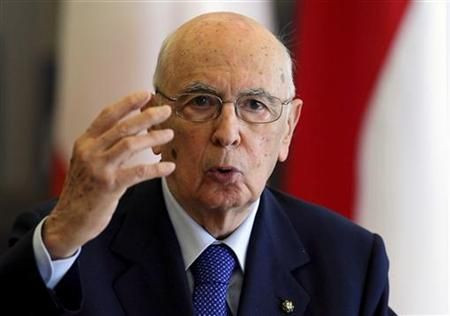Italy Austerity Plan Draws Wide Criticism

Italy's second austerity package in less than a month met with a chorus of criticism a day after becoming law, with the largest union federation threatening a general strike over the "injustice" of the measures.
President Giorgio Napolitano on Saturday signed the emergency decree introducing sweeping austerity measures to cut the fiscal deficit by some 45.5 billion euros ($64.7 billion) and balance the budget in 2013, a year ahead of its previous schedule.
"A missed opportunity," was the comment by the chief economist of the Paris-based Organization for Economic Co-operation and Development, Pier Carlo Padoan, in the daily La Stampa on Sunday.
Padoan said the plan was positive in the pledge to bring forward the balanced budget but it lacked measures to boost growth and tackle tax evasion. Employers' lobby Confindustria estimates Italy's tax evasion totals 120 billion euros.
CGIL Union Confederation Leader Susanna Camusso told La Repubblica the package "hits only those who already pay their taxes," adding that the date of a general strike would be decided at an emergency union meeting on Aug. 23.
The austerity plan sets a "solidarity tax" on those earning more than 90,000 euros per year, to be levied for three years.
Economists, unionists and business leaders agreed a tax on wealth rather than on labor income would have been better because it would have targeted tax evaders who do not declare their real income but often own large assets.
Ferrari Chairman Luca Cordero di Montezemolo told Corriere della Sera newspaper the solidarity tax was "a scandal."
"It's one thing to ask for a solidarity contribution from me or (media tycoon and Prime Minister Silvio) Berlusconi, but it's different to hit an executive supporting his family," he said.
Newspaper editorial comment was largely negative, with former European Commissioner Mario Monti telling Corriere della Sera the package lacked fairness, weighed too heavily on the middle classes and did too little to help growth.
TAX BURDEN
In an interview with business daily Il Sole 24 Ore Confindustria head Emma Marcegaglia said the new tax regime could force managers to seek employment abroad, adding to Italy's hemorrhage of talented workers.
"We are reaching an absolutely disproportionate tax rate on so-called high incomes," Marcegalia said.
She also called the so-called 'Robin Hood Tax', due to hit companies in the energy sector with more than 10 million euros in revenues and one million euros in taxable income, a "folly."
Marcegaglia called for an increase in value added tax and a reform of the system allowing early retirement on the basis of years of pension contributions. Pension spending in Italy is around two percentage points above the euro zone average.
The austerity decree must be passed by parliament within 60 days, during which it will almost certainly be amended. Debate will begin in the Senate on Aug. 22.
Some four billion euros of the 20 billion euros of savings slated for 2012 and 12 billion euros of the 25.5 billion set for 2013 are to come through tax and welfare measures still to be drawn up.
French economist Jean-Paul Fitoussi told Rome daily Il Messaggero that market pressure had forced Italy to take steps which were of no real value and would damage its weak growth.
"Italy is like the protagonist of a Greek tragedy: forced to do things that will be useless and damaging in the long run, but necessary for survival in the short run."
($1=0.703 Euros)
(Editing by Mike Nesbit)
© Copyright Thomson Reuters 2024. All rights reserved.





















